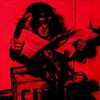Take a photo of a barcode or cover
challenging
informative
medium-paced
informative
inspiring
medium-paced
How does one write a less than stellar review of one of the greatest works by the greatest philosophers of all time? By describing its readability vs its value received.
First, if you have read any decent summaries or discussions of Aristotle's views of poetry and literature (even on grammar), there is very little different here, though perhaps due to translation a bit more confusing in places. If you have not, scholarly summaries of his views are more concise and revealing for the basics. The Poetics is brief, and Aristotle wastes little time is diagramming and categorizing his subjects: what makes poetry/drama worthwhile and how does one know?
Reading the work directly also comes with some surprises. I did not realize, for instance, how much time Aristotle would spend (especially in the second half of the work) discussing the historical nuances of Greek grammar in terms of literary function. For this alone--as almost literally unapproachable for me--if you do not read Greek, this part of the work isn't very accessible! Confining the rest of this review to the broader discussion of literature in the first half, then, I was gratified to see him cite so many examples of poetry and performance of his day, naming works and writers as historical and contemporary, and weighing their artistic skill alongside one another. Spoiler: Euripides is one of his favorites.)
All in all, however, I left the work having learned little that I had not previously studied. On the other hand, I had a better appreciation not only for what the philosopher established for Western art, but how narrow and limited that foundation has since become for the imaginative possibilities art now explores.
First, if you have read any decent summaries or discussions of Aristotle's views of poetry and literature (even on grammar), there is very little different here, though perhaps due to translation a bit more confusing in places. If you have not, scholarly summaries of his views are more concise and revealing for the basics. The Poetics is brief, and Aristotle wastes little time is diagramming and categorizing his subjects: what makes poetry/drama worthwhile and how does one know?
Reading the work directly also comes with some surprises. I did not realize, for instance, how much time Aristotle would spend (especially in the second half of the work) discussing the historical nuances of Greek grammar in terms of literary function. For this alone--as almost literally unapproachable for me--if you do not read Greek, this part of the work isn't very accessible! Confining the rest of this review to the broader discussion of literature in the first half, then, I was gratified to see him cite so many examples of poetry and performance of his day, naming works and writers as historical and contemporary, and weighing their artistic skill alongside one another. Spoiler: Euripides is one of his favorites.)
All in all, however, I left the work having learned little that I had not previously studied. On the other hand, I had a better appreciation not only for what the philosopher established for Western art, but how narrow and limited that foundation has since become for the imaginative possibilities art now explores.
challenging
informative
reflective
slow-paced
DNF
I read like one quote from this book and thought “wow this is going to be dope” and it was so far from what I thought it was gonna be
Tbh I don’t think it’s very deep. Which is crazy because Aristotle is supposed to be like the main dude of depth right?
Or maybe like, the ideas were revolutionary at the time but they’ve been circulating in our collective un/conscious so now it’s more like we’re celebrating history than anything else. Idk.
I read like one quote from this book and thought “wow this is going to be dope” and it was so far from what I thought it was gonna be
Tbh I don’t think it’s very deep. Which is crazy because Aristotle is supposed to be like the main dude of depth right?
Or maybe like, the ideas were revolutionary at the time but they’ve been circulating in our collective un/conscious so now it’s more like we’re celebrating history than anything else. Idk.
2.5-3 stars.
Might be a bit biased since I don't really like how-to's in general.
Might be a bit biased since I don't really like how-to's in general.
informative
inspiring
fast-paced
"To learn gives the liveliest pleasure.” feels very relevant for me a week before I start my Master's degree in writing for stage & broadcast.
I didn't so much love the line about women being inferior.
I didn't so much love the line about women being inferior.
“all human happiness or misery takes the form of action; the end for which we live is a certain kind of action.”
informative
informative
medium-paced






